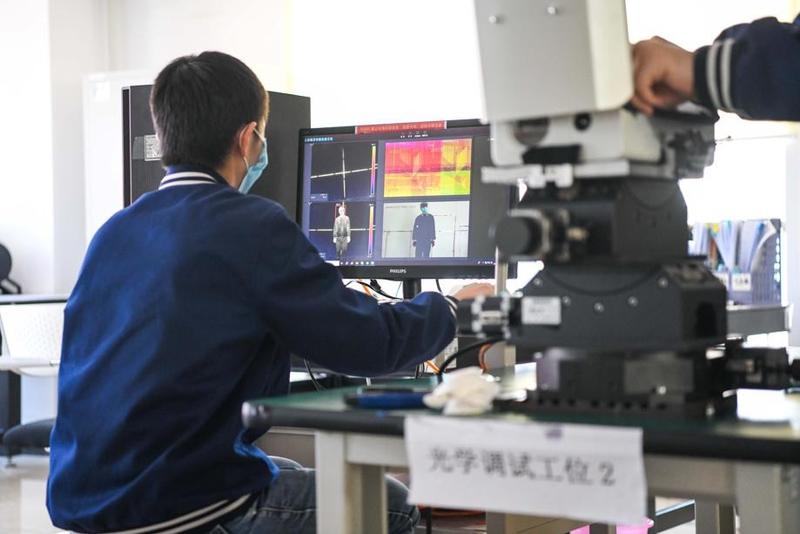 A technician with Harbin Xinguang Optic-Electronics Technology Co tests a thermometer that can detect abnormal body temperature quickly within a 30-meter radius. (PHOTO / XINHUA)
A technician with Harbin Xinguang Optic-Electronics Technology Co tests a thermometer that can detect abnormal body temperature quickly within a 30-meter radius. (PHOTO / XINHUA)
NANJING-From 5G robots, 3D-printed supplies to far-reaching medical advances, China has tackled the novel coronavirus with its tech prowess, which is proven effective as more promising signs signal progress in the country's anti-virus fight.
Cute, swift robots delivering packages, AI-backed voice assistants and unmanned drones with a loudspeaker reminding people to wear masks are no longer confined to the realm of science fiction, but are actually being employed across China.
A smart mobile robot, with functions like facial recognition and temperature screening, has been patrolling the city of Suzhou, East China's Jiangsu province, to help control the spread of the coronavirus.
Featuring technologies such as 5G, cloud computing and intelligent vision, the robot can simultaneously track more than 30 people, according to the Suzhou Innovation Research Institute of Nanjing University, one of its developers.
"The robot can tell whether people are wearing masks, and if not, it will beep and give a verbal reminder," says Chen Jie, a researcher with the institute.
In Nanjing, capital city of Jiangsu, robots replaced deliverymen during the epidemic. Launched by leading Chinese e-commerce company Suning.com, the robots are used to complete door-to-door deliveries, as many neighborhoods have restricted access since the virus outbreak.
According to Suning, the robot has a maximum loading capacity of 145 liters and is disinfected after each delivery. With a positioning accuracy of below 50 mm, it can map out delivery routes and avoid obstacles, working for up to 10 hours on a single charge.
The robot has also played its part in the city of Wuhan, by delivering urgent medical supplies and daily necessities after the city implemented traffic restrictions.
Bruce Aylward, team leader of the China-World Health Organization joint mission on the coronavirus, said he was impressed by China's pragmatic, systemic and innovative approach to control the outbreak after his nine-day field study trip to the country.
After the outbreak, the Suzhou Jiangnan Aerospace Mechanical and Electric Industry Co immediately mobilized nine sets of "mobile hospital" equipment to aid the makeshift hospitals in Wuhan.
The set consists of specialized vehicles that can support rescue workers during surgeries, telecommunications equipment and electricity supply, among other things, according to the company.
To properly handle medical waste, a kind of mobile incineration cabin, with a size of three standard containers, is used in Wuhan, which can incinerate 5 tonnes of medical waste daily, burning waste into harmless ashes within 20 minutes, said the developer Nanjing Luzhou Machine Co.
3D-printed quarantine rooms are also being used on the front line in hardest-hit Hubei province. The rooms, about 10 square meters, are each well-equipped with an air-conditioner, bathroom and shower facilities for patients under quarantine, according to its developer, a materials company based in Suzhou.
Tech companies across China have been devoted to product innovation amid the virus outbreak. A research and development team from Harbin Xinguang Optic-Electronics Technology Co invented a new type of spectrum thermometer in just five days.
"The thermometer can detect abnormal body temperatures within a 30-meter radius in less than one second," says Qu Bo, deputy general manager of the Heilongjiang-based company, adding that they are operating at full capacity to ensure the supplies of epidemic prevention materials.
Chinese scientists are racing to make scientific and technological breakthroughs, says Ding Xiangyang, deputy secretary-general of the State Council.
Nucleic acid testing is playing an important role in coronavirus detection. Experts in Jiangsu's Wuxi have developed a rapid nucleic test kit, which can screen the infection within 15 minutes, according to a biotech company in the city.
A total of 14 products for testing the virus have been approved for clinical use, according to Wu Yuanbin, director-general of science and technology for social development with the Ministry of Science and Technology, at a press conference on March 6.
"Nucleic acid testing can detect the gene sequence of the virus and China's sequencing technical capabilities have proved to be among the best in the world, as the gene of the coronavirus was successfully sequenced in just one week after the outbreak," says Tammy Tan, founder of a biotech company in Jiangsu.


